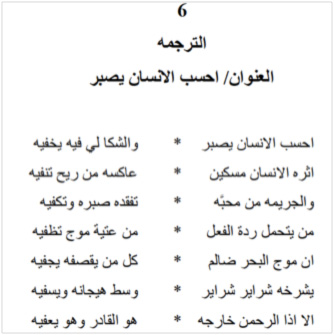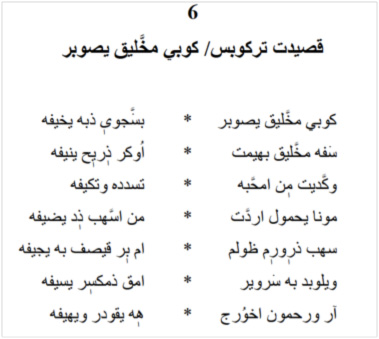
Cartoon by Khalil Bendib on Jadaliyya
Monthly Archives: March 2012
New Work on Mahri Poetry
The DÄ«wÄn of ḤÄjj DÄkÅn, published by the American Institute for Yemeni Studies in 2011, is a collection of eighteen poems in the endangered Mahri language of Yemen and Oman, one of the last, non-Arabic indigenous languages of the Arabian Peninsula. This publication marks an important step in the history of the Mahri language since it contains its first literary texts meant for a local readership. ḤÄjj DÄkÅn, a pioneer of modern Mahri sung-poetry, has included an Arabic translation for each Mahri poem, which is supplemented by an English translation and transliteration into Latin characters provided by Samuel Liebhaber. The DÄ«wÄn is introduced by commentary that places the innovations of ḤÄjj DÄkÅn’s lyric qaṣīdas in their cultural and linguistic context. A facsimile of ḤÄjj’s original handwritten manuscript is included in the DÄ«wÄn. Starting in June 2012, audio and visual recordings of each poem in recitation will be accessible online on the site: http://blogs.middlebury.edu/mahripoetry/.
Sample poem, #6 from The DÄ«wÄn of ḤÄjj DÄkÅn

English translation

Arabic translation

Mahri
Babs of Yemen

For a nice photographic collage of Yemeni doors, check out this VIMEO offering.
Israel’s Moral Peril
 Children hold an Israeli flag in the Jewish settlement of Itamar on the West Bank; Photo by Rina Castelnuovo, The New York Times
Children hold an Israeli flag in the Jewish settlement of Itamar on the West Bank; Photo by Rina Castelnuovo, The New York Times
By Alan Wolfe, The Chronicle of Higher Education, March 25
In the past few years, a trickle of dissent with respect to Israel has turned into a running stream. Books, articles, and Web sites critical of Israel’s treatment of the Palestinians, its acquiescence in the messianic designs of its settlers, its foreign-policy decisions on Gaza, Iran, and much more, and the increasing influence of the ultra-Orthodox over the character of its domestic life have begun to appear in significant numbers in America. Some, but not all, of these efforts, moreover, come from writers unused to being in the critical camp. The question is rapidly becoming not whether one should find fault with Israel, but how.
Two quite contrasting points of view have emerged among the critics. One can be called liberal and the other leftist. Liberals accept Israel’s legitimacy, search for ways that it can respect the rights of its non-Jewish citizens, and believe that the only viable future for the country is a two-state solution, one primarily Jewish, the other primarily Palestinian. Leftists view Israel’s creation in 1948 as an outgrowth of European colonialism, insist that as a Jewish state its character is inevitably racist, and lean toward the eventual creation of one state containing both Jews and Arabs. Should Israel’s actions continue to provoke opposition around the world, the question of which of these approaches will attract the most followers will become increasingly important.
I have a personal interest in this topic because I now count myself among the critics. For decades, I managed to write about some of the more controversial issues dominating the world without writing about the Middle East. The reason was simple: I was too intellectually paralyzed to do so. As a child, I had displayed an Israeli flag and carried blue-and-white coin boxes whose proceeds would plant trees in the new state. That, however, was about it: Serious Hebrew lessons, Zionist summer camps, and trips to the Middle East were of little interest to either my secular parents or me. Yet for all my family’s tendencies toward assimilation, Israel’s legitimacy was never questioned. Jews had been the victims of the greatest monster in history. Supporting the new state was the least the world could do to make up for it. We were, as I recall, vaguely aware that Arabs already lived on the land Israel claimed, but their complaints, to the degree that we heard them at all, seemed trivial by comparison to what had happened to our people. Continue reading Israel’s Moral Peril
Varisco on WBEZ

I was interviewed yesterday on the “Worldview” Program of WBEZ, Chicago. To listen to the broadcast, click here.
Yemen’s new president, Abdu Rabbu Mansour Hadi, has been in power nearly a month. He’s facing trouble in the southern province of Abyan. According to the United Nations High Commissioner for Refugees (UNHCR), the fighting has displaced more than 150,000 people since militants seized several cities in the province last May. Worldview will discuss the humanitarian crisis with Daniel Varisco, professor of anthropology at Hofstra University.
Sharing our values…

This post is not about the value of journalism, but about the blind prejudice that infiltrates much journalistic writing about values. I am not talking about the caricature newscasting of a Fox News Geraldo Rivera, who thinks wearing a hoodie is a problem (just like some maintain that a woman wearing a miniskirt is asking for “it”). Rather it is the prize-touting expert-of-all-trades mentality of Thomas Friedman, whose talking-head status is, in journalistic terms, astronomical. Yesterday, Friedman posted a commentary in The New York Times entitled “A Festival of Lies.”
Friedman begins with a quote from the historian Victor Davis Hanson in The National Review:
“Military assistance or punitive intervention without follow-up mostly failed. The verdict on far more costly nation-building is still out. Trying to help popular insurgents topple unpopular dictators does not guarantee anything better. Propping up dictators with military aid is both odious and counterproductive. Keeping clear of maniacal regimes leads to either nuclear acquisition or genocide — or 16 acres of rubble in Manhattan. What have we learned? Tribalism, oil, and Islamic fundamentalism are a bad mix that leaves Americans sick and tired of the Middle East — both when they get in it and when they try to stay out of it.â€
I certainly agree with Friedman’s gut reaction that “And that is why it’s time to rethink everything we’re doing out there. What the Middle East needs most from America today are modern schools and hard truths, and we haven’t found a way to offer either.” Bravo. Bombs make enemies and schools build friendships: this hardly seems like a new revelation, but it is the kind of truth spoken to power that needs to be voiced time and time again.
But it is what underlies the rationale where I find an all-too-familiar ritual of truths that carry along the heavy baggage of assumptions that belie the argument being made. Continue reading Sharing our values…
How safe is home?

On March 11 an American soldier slipped out of his base before dawn and ended the lives of 17 Afghan civilians, who had returned to what they thought would be a safe home near the protection of the American military base. The general reaction to this is that the man “snapped,” an isolated act. Then there is the case of a Florida vigilante who shot an unarmed, young black kid wearing a hoodie and walking home; the man who shot him claims that it was in self defense. Someone must have “snapped” in the encounter. Yesterday an as-yet-unidentified killer took the life of an Iraqi mother living in El Cajon, California. The murderer snuck into her bedroom and bludgeoned her to near death, leaving a note that said “go back to your country.” Perhaps this was also an individual that “snapped”? A trial is now ending for a student at Rutgers who played a prank on his roommate by setting up a web-cam to record a homosexual encounter; his roommate killed himself. I guess one could say that the suicide happened because this young man “snapped”? Four different deaths, but all assumed to be because an individual acted in an abnormal way, a criminal act (suicide is still a criminal act in U.S. law) that goes counter to a society’s moral norms.
Such immoral acts have been going on since the get-go of human civilization; even ardent biblical literalists point to the fratricide of Cain. But assuming that an individual has “snapped” explains nothing, except to say “well, that is not supposed to happen.” Following the media, we are far too snap-happy in explaining away murder. Consider the bumper sticker mentality that “guns do not kill people, but people do.” To me this is like saying that malaria doesn’t kill people, but mosquitoes who carry the malaria do. Obviously it is a combination of the two. People use guns to kill people, either issued by the military (as in Afghanistan) or because of a constitutional American right to bear arms and stand one’s ground (as in Florida). People also use knives and steel rods, or even their bare hands. There are various means, but is it really useful to cite “snapping” as the rationale? Continue reading How safe is home?
Women in Yemen’s Arab Spring

The website arabwomenspring has posted a summary of Yemeni women’s participation in the recent political protests and historical background on their role in governance. Below is an outline of the contents of the online report:
1 Women’s participation in demonstrations
1.1 Time-line of key events
2 Women’s participation in political life: opportunities and obstacles
2.1 Representation in government
2.2 Representation in parliament
2.3 Representation in local councils
2.4 Representation in the judiciary
3 A discriminatory legal framework
3.1 CEDAW
3.2 The Constitution
3.3 Other discriminatory laws
4 Further reading